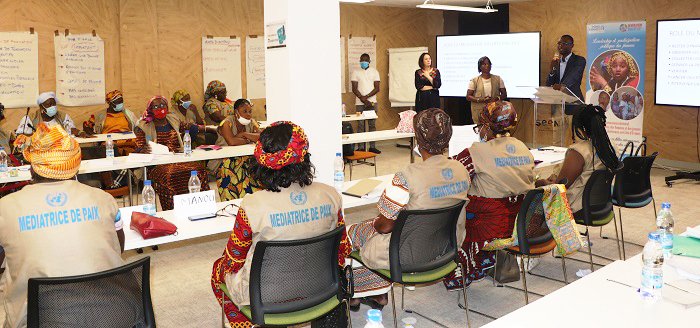
Governance, Political Participation and Women's Leadership

General context and main challenges
Although the country has ratified almost all international and regional agreements for the promotion of women's rights and despite its Constitution, which proclaims gender equality and has reaffirmed this position since 2016, the representation of women in decision-making positions in Côte d'Ivoire is below the regional average for sub-Saharan Africa and far from the 30% quota of women in decision-making positions to which the country has officially committed. In fact, the proportion of female representation remains marginal, considering that women represent 48 percent of the population (RGHP 2014). They have little influence on the development process, as they are very much in the minority in the national institutions responsible for the key decisions that govern their lives.
As an example, only 8 of the 49 members of the current Government are women, a ratio of 16%. In Parliament, only 30 out of 255 deputies are women in the National Assembly, a ratio of 11.76% (29 elected deputies and 1 substitute), while in the Senate, only 19 out of 99 senators are women (a ratio of 19.2%). Only 16 of the 201 mayors are women (7.46%) and only one Ivorian regional council is chaired by a woman, which is equivalent to a representation rate of 3.22%.
UN Women's actions in Côte d'Ivoire
- In October 2019, a law adopted in favor of women's representation in elected assemblies;
- The introduction of the program "The Incubator of Girls in Politics" since October 31, 2019;
- Support for the establishment of the platform of women political leaders for peaceful elections in 2020-2021. This initiative is the result of collaboration between UN Women, the African Union, UNESCO and UNDP;
- 528 women mediators trained in the prevention, management and early warning of community conflicts;
- A network of women operating as peace mediators and early warning monitors, deployed in 10 localities in the North, Center, West and South of Côte d'Ivoire set up;
- Gender clubs set up in the Universities since 2017;
- A review of discriminatory texts carried out;
- A study on the representation of women in the decision-making bodies of public and semi-public administrative entities was carried out in collaboration with the European Union;
- Côte d'Ivoire produced a national report on the implementation of the Beijing Platform for Action (Beijing +25);
- A gender strategy developed for the Independent Electoral Commission;